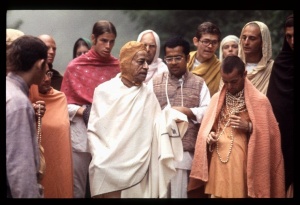SB 9.7.20: Difference between revisions
m (1 revision(s)) |
No edit summary |
||
| Line 1: | Line 1: | ||
{{info | {{info | ||
|speaker= | |speaker=Śukadeva Gosvāmī | ||
|listener=King | |listener=King Parīkṣit | ||
}} | }} | ||
[[Category:Srimad-Bhagavatam - Canto 09 Chapter 07]] | |||
[[Category:Bhagavatam Verses Spoken by Sukadeva Gosvami - Vanisource|090720]] | |||
<div style="float:left">'''[[Srimad-Bhagavatam]] - [[SB 9|Ninth Canto]] - [[SB 9.7: The Descendants of King Mandhata|Chapter 7: The Descendants of King Māndhātā]]'''</div> | |||
<div style="float:right">[[File:Go-previous.png|link=SB 9.7.19]] '''[[SB 9.7.19]] - [[SB 9.7.21]]''' [[File:Go-next.png|link=SB 9.7.21]]</div> | |||
{{RandomImage}} | |||
==== TEXT 20 ==== | ==== TEXT 20 ==== | ||
<div | <div class="verse"> | ||
ṣaṣṭhaṁ saṁvatsaraṁ tatra | :ṣaṣṭhaṁ saṁvatsaraṁ tatra | ||
caritvā rohitaḥ purīm | :caritvā rohitaḥ purīm | ||
upavrajann ajīgartād | :upavrajann ajīgartād | ||
akrīṇān madhyamaṁ sutam | :akrīṇān madhyamaṁ sutam | ||
śunaḥśephaṁ paśuṁ pitre | :śunaḥśephaṁ paśuṁ pitre | ||
pradāya samavandata | :pradāya samavandata | ||
</div> | </div> | ||
| Line 19: | Line 24: | ||
==== SYNONYMS ==== | ==== SYNONYMS ==== | ||
<div | <div class="synonyms"> | ||
''ṣaṣṭham''—the sixth; ''saṁvatsaram''—year; ''tatra''—in the forest; ''caritvā''—wandering; ''rohitaḥ''—the son of Hariścandra; ''purīm''—in his capital; ''upavrajan''—went there; ''ajīgartāt''—from Ajīgarta; ''akrīṇāt''—purchased; ''madhyamam''—the second; ''sutam''—son; ''śunaḥśepham''—whose name was Śunaḥśepha; ''paśum''—to use as the sacrificial animal; ''pitre''—unto his father; ''pradāya''—offering; ''samavandata''—respectfully offered his obeisances. | |||
</div> | </div> | ||
| Line 26: | Line 31: | ||
==== TRANSLATION ==== | ==== TRANSLATION ==== | ||
<div | <div class="translation"> | ||
Thereafter, in the sixth year, after wandering in the forest, Rohita returned to the capital of his father. He purchased from Ajīgarta his second son, named Śunaḥśepha. Then he offered Śunaḥśepha to his father, Hariścandra, to be used as the sacrificial animal and offered Hariścandra his respectful obeisances. | Thereafter, in the sixth year, after wandering in the forest, Rohita returned to the capital of his father. He purchased from Ajīgarta his second son, named Śunaḥśepha. Then he offered Śunaḥśepha to his father, Hariścandra, to be used as the sacrificial animal and offered Hariścandra his respectful obeisances. | ||
</div> | </div> | ||
| Line 33: | Line 38: | ||
==== PURPORT ==== | ==== PURPORT ==== | ||
<div | <div class="purport"> | ||
It appears that in those days a man could be purchased for any purpose. Hariścandra was in need of a person to sacrifice as the animal in a yajña and thus fulfill his promise to Varuṇa, and a man was purchased from another man for this purpose. Millions of years ago, animal sacrifice and slave trade both existed. Indeed, they have existed since time immemorial. | It appears that in those days a man could be purchased for any purpose. Hariścandra was in need of a person to sacrifice as the animal in a ''yajña'' and thus fulfill his promise to Varuṇa, and a man was purchased from another man for this purpose. Millions of years ago, animal sacrifice and slave trade both existed. Indeed, they have existed since time immemorial. | ||
</div> | </div> | ||
__NOTOC__ | |||
<div style="float:right; clear:both;">[[File:Go-previous.png|link=SB 9.7.19]] '''[[SB 9.7.19]] - [[SB 9.7.21]]''' [[File:Go-next.png|link=SB 9.7.21]]</div> | |||
__NOTOC__ | |||
__NOEDITSECTION__ | |||
Revision as of 15:55, 15 May 2021

A.C. Bhaktivedanta Swami Prabhupada
TEXT 20
- ṣaṣṭhaṁ saṁvatsaraṁ tatra
- caritvā rohitaḥ purīm
- upavrajann ajīgartād
- akrīṇān madhyamaṁ sutam
- śunaḥśephaṁ paśuṁ pitre
- pradāya samavandata
SYNONYMS
ṣaṣṭham—the sixth; saṁvatsaram—year; tatra—in the forest; caritvā—wandering; rohitaḥ—the son of Hariścandra; purīm—in his capital; upavrajan—went there; ajīgartāt—from Ajīgarta; akrīṇāt—purchased; madhyamam—the second; sutam—son; śunaḥśepham—whose name was Śunaḥśepha; paśum—to use as the sacrificial animal; pitre—unto his father; pradāya—offering; samavandata—respectfully offered his obeisances.
TRANSLATION
Thereafter, in the sixth year, after wandering in the forest, Rohita returned to the capital of his father. He purchased from Ajīgarta his second son, named Śunaḥśepha. Then he offered Śunaḥśepha to his father, Hariścandra, to be used as the sacrificial animal and offered Hariścandra his respectful obeisances.
PURPORT
It appears that in those days a man could be purchased for any purpose. Hariścandra was in need of a person to sacrifice as the animal in a yajña and thus fulfill his promise to Varuṇa, and a man was purchased from another man for this purpose. Millions of years ago, animal sacrifice and slave trade both existed. Indeed, they have existed since time immemorial.